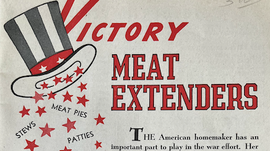Cottage cheese is having its moment. Every time I open TikTok, Instagram, or Pinterest, it seems to be a cascade of high protein recipes featuring the curds.
Maybe that’s unsurprising given the focus many consumers have on eating high protein foods. What is surprising to me is every time I see cottage cheese mentioned in a recipe description, the creator notes how it’s hidden, barely noticeable at all, or only there for a nutritional bump, never for its taste.
Apparently not a lot of people like cottage cheese on its own. That’s weird to me because I love it. And I had no idea I was in the minority. I assumed Catherine was the weird one when she cast aspersions my way whenever she caught me eating it plain out of the container in front of an open fridge.
I guess I may have a unique love for cottage cheese because my absolute favourite food growing up was my Oma's cottage cheese pierogies.
No potato in these babies. Just dry curd cottage cheese, eggs, and a touch of salt and pepper. And we didn't eat them with sour cream and bacon bits, oh no. The pierogies of my childhood were smothered in what was described at Oma's house only as "white sauce." I only realized much later in life it was a modified bechamel that she had figured out how to make perfectly in the microwave.
If I take a step back, I can objectively see why cottage cheese isn't appealing to many people. If I'm really honest, I can see that the pierogies I used to eat 20 at a time as a kid don't have the most interesting or unique flavour profile.
But I still love them. So much.
While cottage cheese may be bland on its own, to me it’s seasoned with many happy childhood memories.
According to psychologists, our past memories have a lot to do with our present enjoyment of food.
Memories are triggered by sensory stimulation. Since eating is one of the only activities we do that involves all five primary senses, it leads to associated memories being very strong. So when I’m enjoying cottage cheese in any form, it triggers feelings tied to the memories of my Oma showing her love through food.
The flip side of this is a phenomenon is called conditioned taste aversion, where the memory of consuming foods that make us ill or feel bad lasts a very, very long time. Catherine still can’t bear to drink orange Gatorade because it reminds her of sick days as a kid.
Recognition that our enjoyment or dislike of a particular food is only partially due to qualities inherent to a food itself is really important to me for two reasons. One personal and one professional.
Personally, Catherine and I are working to make mealtime and eating more generally a positive experience for our four-year-old George. We want him to have a healthy relationship with food and his body. Understanding that this involves a lot more than the choices we make about what to serve him has actually helped us a lot.
Professionally, Juno’s success is dependent on whether or not you enjoy the food we make. That much is obvious. Realizing that your enjoyment of a Bump Burger or any of our other products involves more than just how they taste, that was a revelation.
We try to put that knowledge into action by avoiding marketing messages that trigger feelings of guilt or shame. We also strive to make products that are a mix of exciting and new, like our miso mushroom meatballs, but also with ingredients like our ground beef that are familiar and can be used in your favourite childhood recipes.
We are also working on a few exciting projects to help you create more positive food memories this fall and winter including workshops and pop-ups.
At the end of the day, our relationship with food is one that’s deeply personal. I’m never going to forget that what you and your family enjoy eating is the result of a complex mix of taste preferences, cultural norms, life experiences, and nutritional needs.
If you have any suggestions about what we should be doing to make your mealtimes more memorable, let me know by emailing hello@eatbump.com.




